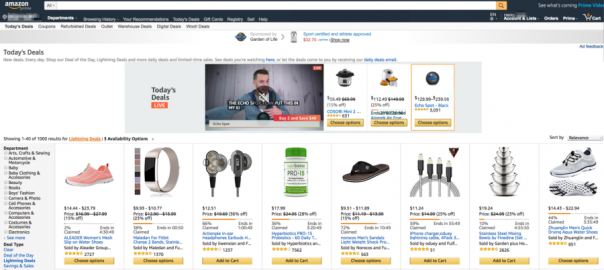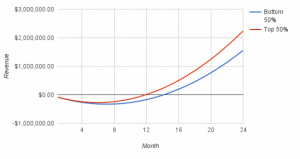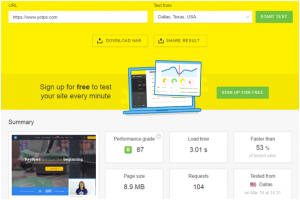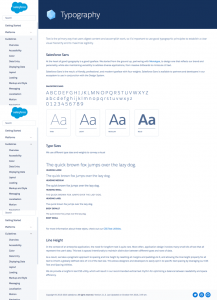— June 13, 2018
Amazon’s marketplace is just as lucrative as it is crowded.
To profit as a seller, you have to stand out against over two million merchants. But if you do grab buyers’ attention, you’re bound to make sales since so many shoppers flock to Amazon. The average conversion rate in the marketplace is roughly 15%, roughly three to five times that of other e-commerce sites.
The key to reaching Amazon shoppers is maximizing your listings’ visibility. There are so many products on the marketplace, and buyers don’t have the time or patience to sift through every single one. Make it easy for buyers to find your products and you’re on track to win greater sales.
To boost your listings’ visibility, we’ll highlight nine key ways to drive external traffic outside of Amazon and internal traffic within the marketplace to your products. Using these strategies leads buyers right to your listings, so they can make their way down your sales funnel and grow to become a customer.
What Visibility Means for Amazon Listings
For products on your own online store, promotion is straightforward. You spread product awareness outside of your store through ads and other marketing efforts to drive traffic back to your listing pages.
Amazon listings are more complicated—they require both external and internal promotion. With so much competition in the marketplace, sellers have to craft their listings to be highly visible on Amazon’s website, not just outside of it.
External Promotion
External promotion for Amazon listings is simply using outside channels to drive traffic back to your listing. It allows you to hook shoppers who aren’t already on Amazon to check out your listing.
Here are a few examples of external promotion methods for Amazon listings:
- Social media: Create ads and connect with influences to spread awareness of your Amazon products and link back to your listings on social media.
- SEO: Include keywords your target buyers are Googling in your product listing to have it rank high in search engine results.
- Getting backlinks: Find opportunities to link to your Amazon listings—such as publishing blog posts—to increase your items’ visibility and drive external traffic to your products.
With external promotion, you can make your listings stand out to shoppers outside of Amazon and maximize your sales.
Internal Promotion
Say you’re an Amazon merchant, and you want to sell women’s sunglasses. You won’t be the only merchant selling the accessory on the marketplace—there are over 40,000 other sellers also offering women’s sunglasses.
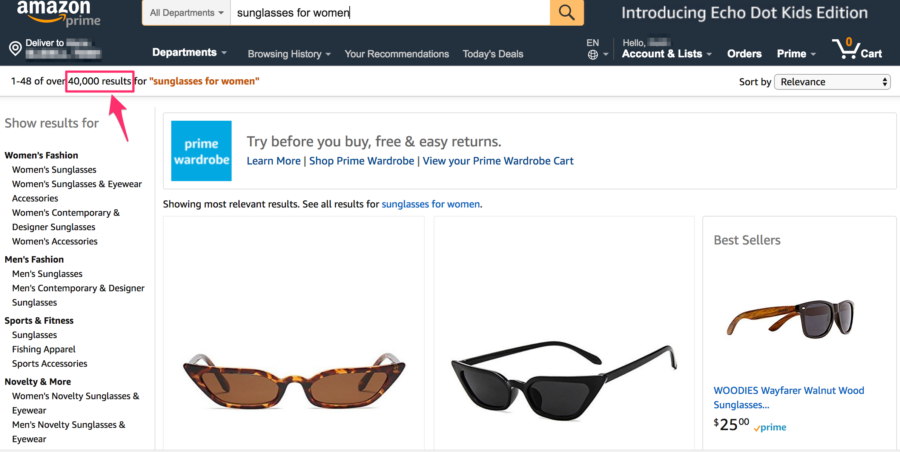
Sunglasses aren’t an exception—Amazon, across all products, is saturated with merchants. To beat the competition, you have to find ways to increase your product listings’ visibility on the marketplace.
Here are a few examples of internally promoting your Amazon products:
- Win the Buy Box. When sellers share a single listing on Amazon because they all sell the same product, there’s always a Buy Box—the first highlighted price option.
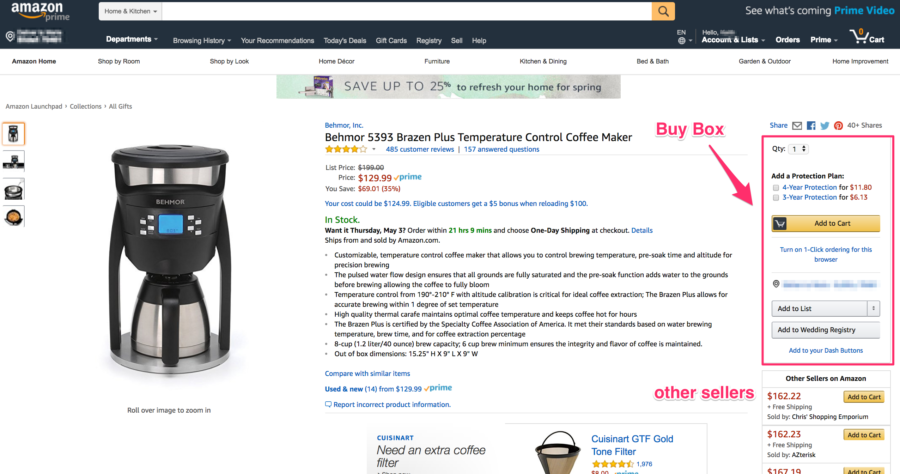
Winning the Buy Box means prime visibility, so it’s a key way of attracting buyers on Amazon. Amazon considers a multitude of factors to pick the Buy Box seller—mainly price, but also others like seller rating and shipping type.
- Rank high on Amazon product search results. Most buyers won’t move past the first page of search results, so getting a high ranking is a critical way to reach shoppers. According to Amazon Seller Central, the marketplace search engine considers text match, price, availability, selection, and sales history to rank listings.
These internal promotion tactics ensure that shoppers can easily find your listing in Amazon’s crowded marketplace and make a purchase.
9 Ways to Promote Your Amazon Listings
Requiring both internal and external methods, an ideal Amazon promotion plan includes a mix of tactics. You have to understand both the marketplace policies—Buy Box winning, search rankings—as well as ways to drive outside traffic to your listing to maximize sales. In this guide, we’ve outlined nine strategies for driving traffic from inside and outside of Amazon to your listing.
Let’s dive in.
1. Optimize Your Listings with SEO
Search engine optimization attracts a wide range of buyers to your listing. Both shoppers who are already on Amazon and those who are using other sites can find your listing when you include popular keywords. With these additions, search engines—both Amazon’s and others—determine that your listing is a relevant result and rank it higher.
There are a few key tools to identify the keywords your shoppers are searching for most frequently.
- Google Keyword Planner: This free tool indicates the monthly search volume of keywords on Google’s search engine. Since Amazon listings can rank on Google, this tool is especially helpful.
- Scope: A keyword tool that’s specifically geared for Amazon. It allows you to track keywords’ monthly volume, ranking position over time, estimated sales, and more.
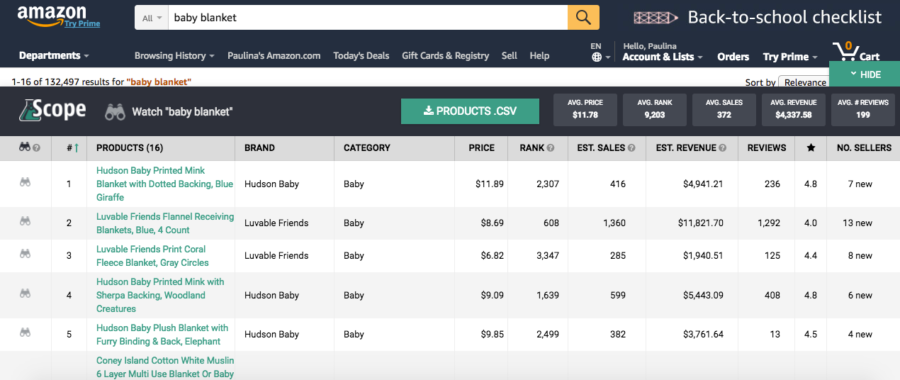
[Source]
You can learn more about other SEO tools for finding keywords using this guide.
Once you’ve collected your keywords, place them throughout your listing, such as in the title and description. Detecting these popular keywords, search engines will recognize your listing as a relevant result for your buyers’ searches and rank it higher.
2. Buy Sponsored Product Ads
Even with SEO, there’s no guarantee that your listing will be placed higher in Amazon’s search results. The marketplace’s engine considers other factors for ranking—selling history, price, and more—so SEO alone doesn’t necessarily lead to higher rankings.
To gain more control over their listings’ visibility, Amazon sellers can pay for the marketplace to sponsor their products and place them higher in search results.
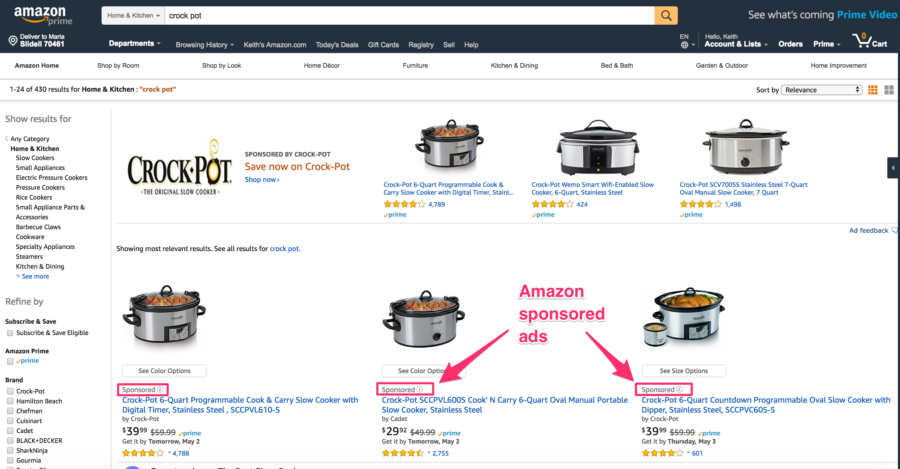
Sellers only pay when shoppers click on their ad, so the payoff with Amazon promotion is guaranteed. Your listings’ visibility is increased, so shoppers on Amazon can easily find your product and potentially make a purchase.
3. Share Listings on Social Media
The average person spends nearly two hours per day on social media platforms. Given this popularity, sharing your Amazon listings on social media through your business’ accounts is a powerful way of getting your products in front of more buyers.
Since your followers expect to receive value from your posts, it’s best to avoid creating posts on your account that are basically ads for your listings. Instead, it’s better to share your listing in more subtle ways that are still helpful to your followers. Here are a few ideas:
- Use a social media promo code. Merchants with a Professional Selling account on Amazon can create a promotion link to share through social media about a discount they’re offering on the listing. Unlike a traditional ad, sharing a promo code gives users value by helping them save money. For more details on setting up this promo code, check out this guide.
- Share content that includes your listing link. Posting an informative, helpful blog post or video that includes a link to your Amazon listing, such as a How-to video or list post, is a great way to indirectly promote your products through social media.
- Host a contest or giveaway. Announce through your social media accounts that any user who posts your Amazon listing in their bio will be entered for a chance to win a prize. This reward will motivate users to share your listing and spread the word about your Amazon products.
By creating social media content that is exciting and relevant, you can promote your Amazon listings through social media in a way that feels natural rather than invasive.
4. Run Competitor Analysis
For internal visibility on Amazon, your listings need to stay ahead of competitors’ products. In buyers’ searches, your products will fall behind competitors’ items in rankings if you aren’t monitoring how those listings are engaging shoppers.
To keep your listings high in Amazon’s search rankings, there are a few factors you should monitor in competitors’ listings:
- Price. You want to keep your listings’ prices at or lower than competitors’ not only because shoppers are looking for the best deals—you also want to win the Buy Box if you’re sharing a listing with other sellers, and Amazon highly prioritizes price in choosing the box winner.
- Images. When Amazon shoppers are browsing through search results, they’re not only looking at price—they’re also checking out images. Visuals can be a very persuasive factor in encouraging purchases, so you want to make sure that your listing has more images with a higher quality than competing items.
- Text. If your listing currently isn’t ranking high for your product keywords, it might be because the listing text isn’t considered relevant by Amazon’s search engine. Analyze the text of the current top-ranking listings to search for potentially relevant keywords that you can include to boost your product.
Finding ways to make your listing outshine competitors’ items on Amazon will increase your product rank in the marketplace’s search results.
5. Partner With Influencers
Just like products on an online store, Amazon listings can gain significant traffic through influencer marketing. When prominent individuals in your industry stand behind your product and link to your listing, it sends a message to communities of your key buyers that your listing is worth checking out.
To promote your listing through influencer marketing, start by coming up with a list of key individuals in your sector with a large base of social media followers. You brainstorm this list by considering your own personal network or use an influencer platform like Influence.co.

Once you have a list going, check out this guide to learn about the best ways to reach out to influencers and measure results once they share your Amazon listings.
6. Maintain Strong Product Ratings
First impressions matter when you’re on a marketplace as competitive as Amazon. Buyers are browsing through thousands of products, so they won’t settle for items that seem low-quality.
A clear way to give shoppers a positive first impression of your Amazon listings is to maintain high-star ratings. When buyers are browsing through their Amazon search results, the star ratings are visible for each product.
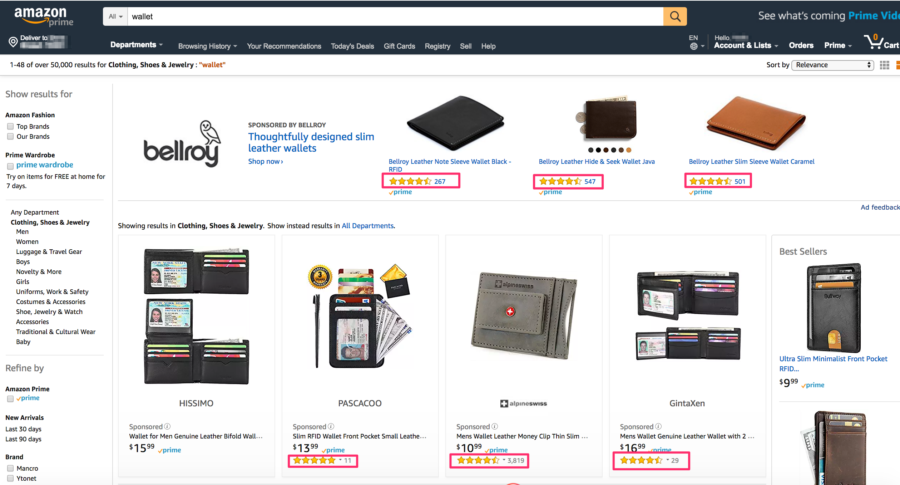
Along with price, these star ratings are a major factor in whether shoppers decide to click on your listings. They can’t see your products in-person, so this feedback from other buyers is especially meaningful to shoppers trying to make a purchase.
Here are a few tips for maintaining high-star ratings on all of your Amazon listings:
- Describe your item exactly as it is in your listing. False product details and images may boost sales initially, but ultimately they only hurt your Amazon business. Buyers who receive a product that’s totally different from the listing are bound to leave a low rating in disappointment.
- Provide excellent customer service. If you don’t handle customer requests properly, such as shipping the item late or not being prompt in completing a return, you’ll anger buyers. Avoid receiving a low product rating by delivering the item as expected and promptly resolving issues.
- Reach out to disappointed buyers. When a customer leaves a poor rating, reach out to the buyer to see if you can still resolve their issue. If you can fix their problem, they do have the power to edit their review and could adjust their rating to improve the product’s overall score.
Ratings are a key way for buyers to quickly assess your Amazon products. Make sure your items’ scores stay high to keep buyers interested in your listing.
7. Maintain Strong Shipping Performance
Shipping, at first, might seem totally unrelated to promoting your products. But on Amazon, your shipping performance is a key factor in your listings’ visibility.
Amazon wants to keep shoppers happy, so they discourage poor shipping practices by making shipping a factor in winning the Buy Box and ranking high on Amazon’s search rankings. With consistent shipping issues, you’re less likely to win the Box or to rank high in search.
Instead of hurting your visibility, use these tips to maintain a strong shipping performance on Amazon:
- Regularly check your shipping performance metrics. In Amazon Seller Central, you can monitor several key shipping performance metrics—on-time delivery rate, valid tracking rate—to ensure that you’re consistently offering great shipping and pleasing customers.
- Use Amazon FBA. By signing up for Fulfillment by Amazon, sellers no longer have to worry about providing great shipping as the marketplace handles fulfilling your orders. If there are any complaints about your shipping from buyers, the marketplace will remove the rating since they are responsible for shipping issues.
- Use inventory management software. Adopting an inventory management program, like Sellbrite, keeps you on track so you can avoid understocking and being unable to complete orders. Sellbrite monitors when your stock is low across channels so you always know when to reorder.
Always provide great shipping and you won’t hurt your chance at winning the Buy Box or at ranking high in search results. With this visibility, Amazon shoppers can easily find your products.
8. Monitor Your Seller Rating
Like shipping performance, your overall seller rating on Amazon also impacts your chances of winning the Buy Box and ranking high in Amazon’s search results.
Punishing low-rated sellers with less visibility is a measure to keep Amazon shoppers happy and sustain the marketplace. It ensures that buyers are first and foremost working with merchants who have a positive record and can provide great service.
To keep your listings visible on Amazon, follow these tips to maintain a high seller rating:
- Monitor your seller rating. On Seller Central, you can view the factors that contribute to your overall seller rating—such as Perfect Order Percentage and Late Response Rate—and determine which ones need to be improved to increase it.
- Be prompt in customer service. Set a daily reminder to resolve customer issues and respond to customer messages. The quicker you give buyers attention, the more impressed they’ll be with your service.
- Determine whether negative feedback could be removed. Amazon has clear guidelines on providing feedback. Review this post to determine whether any of your negative feedback from buyers should be removed.
Make an effort to keep your seller rating as high as possible and you’ll help your listings stay visible through the Buy Box and Amazon search results.
9. Launch a Lightning Deal
Beyond convenience, many shoppers come to Amazon for the marketplace’s low prices. With this interest, a primary way of attracting Amazon shoppers to your listing is by launching a Lightning Deal.
Lightning Deals are time-based, marked-down products that buyers can find in Amazon’s Today’s Deals section. They draw a lot of attention and sales from Amazon’s shoppers not only because they appreciate discounts, but also because their limited time frame motivates buyers to make a purchase.
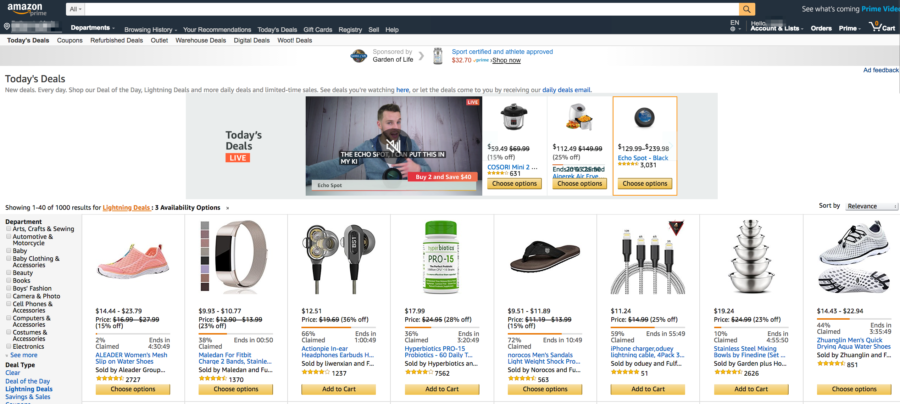
Sellers have to pay a fee and Amazon has to approve Lightning Deals before they’re launched.
Here are a few of the key guidelines that sellers need to meet for their Lightning Deals to be approved:
- Lightning Deals run for four to twelve hours.
- Lightning Deals can only run once in a seven-day period.
- You should have your proposed quantity for the deal available at least seven days before the deal is expected to launch.
To learn more about Lightning Deal guidelines and setting them up, review this guide. With these Lightning Deals, more buyers will come across your listings in the Today’s Deals section and be driven to purchase with the limited promotion time frame.
Play with Promotion to Boost Amazon Sales
Promoting Amazon products is unlike traditional marketing for a single store, where you’re mainly focused on driving external traffic. You also have to find ways to increase your listings’ visibility internally on Amazon. The marketplace is so competitive, so you have to find innovative ways to make products stand out against other sellers’ items.
To simplify promotion on Amazon, make the most of the nine key strategies here for boosting your listings’ visibility inside and outside of the marketplace. Experiment with these different methods, and track your results to see which ones lead to greater sales. The more you test these tactics, the better prepared you’ll be to win Amazon buyers’ attention and stay ahead of competitors.
Digital & Social Articles on Business 2 Community
(131)
Report Post